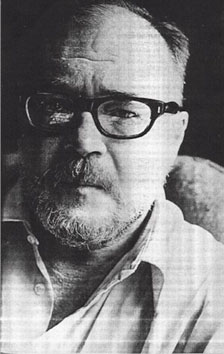Autumn Begins in Martins Ferry, Ohio by James Wright
Teaching intro workshops, I read a lot of bad poems about football. This is a good one.
Autumn Begins in Martins Ferry, Ohio
In the Shreve High football stadium,
I think of Polacks nursing long beers in Tiltonsville,
And gray faces of Negroes in the blast furnace at Benwood,
And the ruptured night watchman of Wheeling Steel,
Dreaming of heroes.
All the proud fathers are ashamed to go home.
Their women cluck like starved pullets,
Dying for love.
Therefore,
Their sons grow suicidally beautiful
At the beginning of October,
And gallop terribly against each other's bodies.
 James Wright was born in Martins Ferry, Ohio, on December 13, 1927. His father worked for fifty years at a glass factory, and his mother left school at fourteen to work in a laundry; neither attended school beyond the eighth grade. In 1972, his Collected Poems received the Pulitzer Prize in poetry. He died in New York City in 1980.
James Wright was born in Martins Ferry, Ohio, on December 13, 1927. His father worked for fifty years at a glass factory, and his mother left school at fourteen to work in a laundry; neither attended school beyond the eighth grade. In 1972, his Collected Poems received the Pulitzer Prize in poetry. He died in New York City in 1980.
Autumn Begins in Martins Ferry, Ohio
In the Shreve High football stadium,
I think of Polacks nursing long beers in Tiltonsville,
And gray faces of Negroes in the blast furnace at Benwood,
And the ruptured night watchman of Wheeling Steel,
Dreaming of heroes.
All the proud fathers are ashamed to go home.
Their women cluck like starved pullets,
Dying for love.
Therefore,
Their sons grow suicidally beautiful
At the beginning of October,
And gallop terribly against each other's bodies.
 James Wright was born in Martins Ferry, Ohio, on December 13, 1927. His father worked for fifty years at a glass factory, and his mother left school at fourteen to work in a laundry; neither attended school beyond the eighth grade. In 1972, his Collected Poems received the Pulitzer Prize in poetry. He died in New York City in 1980.
James Wright was born in Martins Ferry, Ohio, on December 13, 1927. His father worked for fifty years at a glass factory, and his mother left school at fourteen to work in a laundry; neither attended school beyond the eighth grade. In 1972, his Collected Poems received the Pulitzer Prize in poetry. He died in New York City in 1980.




